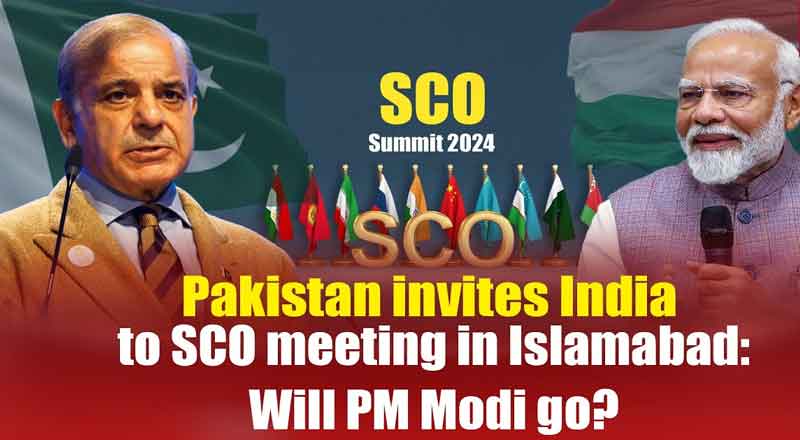Tensions in India-Pakistan Relations
The relationship between India and Pakistan has been highly strained since 2019, following significant events like the Pulwama terror attack, the subsequent Balakot airstrikes, and the abrogation of Article 370, which altered the status of Jammu and Kashmir. India’s firm stance on not engaging in dialogue with Pakistan as long as cross-border terrorism persists has kept diplomatic ties at a low. Despite numerous attempts by Pakistan to initiate talks, India’s position remains unchanged: terrorism and diplomacy cannot go hand in hand.
In this backdrop, the invitation extended by Pakistan to Indian Prime Minister Narendra Modi for the upcoming Heads of Government (HOG) meeting of the Shanghai Cooperation Organisation (SCO) in Islamabad in October 2024 raises complex questions. Should PM Modi attend this summit? Would his presence signal a potential thaw in India-Pakistan relations? Many in India argue that such an attendance could send the wrong message both domestically and globally, suggesting a softening of India’s firm stance on terrorism.
India’s Strategic Engagement with the SCO
India has been an active participant in the SCO, a regional platform that includes several important players such as China, Russia, and four Central Asian nations. For India, the SCO serves as a useful diplomatic tool, enabling engagement with the leadership of these countries on strategic and security-related matters. The organization also allows India to strengthen its regional influence, particularly in Central Asia, a region where China’s presence has been dominant.
The SCO has, on multiple occasions, facilitated useful diplomatic exchanges for India. For instance, during the Doklam standoff in 2017, PM Modi and Chinese President Xi Jinping met briefly on the sidelines of the SCO Astana Summit. This interaction helped calm tensions, leading to the “Astana Consensus,” which emphasized that differences should not escalate into disputes. Similarly, after the 2020 Galwan Valley clashes, high-level meetings between Indian and Chinese defense and foreign ministers occurred on the margins of SCO meetings, providing crucial opportunities for dialogue.
However, the SCO’s importance to India extends beyond bilateral issues. The organization offers a multilateral platform where regional security, economic cooperation, and counter-terrorism are discussed. As such, India’s active participation in the SCO showcases its commitment to regional stability and cooperation.
The Question of Attending the Islamabad Summit
Despite the strategic significance of the SCO, the possibility of PM Modi attending the summit in Islamabad remains controversial. Given the current state of India-Pakistan relations, many argue that sending a high-level Indian delegation, especially PM Modi, to Pakistan could be misinterpreted as a willingness to engage diplomatically with Pakistan despite ongoing terrorism. Furthermore, such a move could be seen as rewarding Pakistan, a country that has continued to support cross-border terrorism against India.
An alternative option being considered is sending External Affairs Minister S. Jaishankar to represent India at the summit. This would maintain India’s commitment to the SCO without the symbolic weight of PM Modi’s presence in Pakistan. Such a decision would ensure India remains engaged with the SCO while avoiding the potential political fallout of an in-person visit by the prime minister to Islamabad.
Past Precedents and Strategic Calculations
India has previously made calculated decisions regarding its participation in SCO meetings. For example, in July 2023, India hosted the SCO Heads of State (HOS) Summit in a virtual format. Although many Central Asian nations and Iran had confirmed their leaders’ attendance in person, India opted for an online meeting. Speculation suggested that this decision was influenced by China’s uncertainty regarding President Xi Jinping’s participation. Moreover, with tensions high between India and Pakistan, the presence of the Pakistani prime minister in New Delhi could have overshadowed the summit’s substantive agenda.
This decision to go virtual was seen as a strategic move, especially in light of the growing geopolitical tensions between the West and Russia, and the proximity of the summit to PM Modi’s successful state visit to the United States. Hosting leaders like Russian President Vladimir Putin, Iranian President Ebrahim Raisi, and Belarusian President Alexander Lukashenko in person could have created uncomfortable optics for India, particularly in the context of its deepening ties with the West. Thus, India’s decision to host the summit virtually was a prudent one, allowing it to avoid unnecessary diplomatic complications.
The Path Forward for India at the SCO
As the 2024 SCO HOG summit in Islamabad approaches, India must carefully weigh its options. Attending the summit in person could help maintain strong engagement with other SCO member states, but it risks sending conflicting signals about India’s stance on Pakistan. On the other hand, sending a representative like the External Affairs Minister would allow India to participate meaningfully in the summit without compromising its position on terrorism.
Ultimately, India’s participation in the SCO is crucial for its broader regional strategy, particularly with regard to Central Asia and China. However, given the sensitive nature of India-Pakistan relations, any decision regarding the level of participation at the Islamabad summit will need to be made with careful consideration of both diplomatic and domestic consequences. The key is to balance India’s strategic interests within the SCO framework without compromising its principled stance on terrorism.
In conclusion, while the SCO remains a valuable platform for India, attending the 2024 summit in Pakistan presents significant diplomatic challenges. A carefully calibrated approach, possibly through representation at a lower level, might be the best way forward to maintain engagement without sending the wrong message.
(With inputs from agencies)





